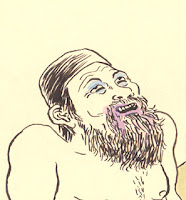 The inspiration
for the hit TV cop drama Hill Street Blues,
this film opens with a drugged out hooker shooting two policemen dead in their
car and goes roaring off from there. Starring Paul Newman and Ed Asner the
action takes place in the South Bronx one of the poorest areas in the city. The
precinct is one of the worst and most dilapidated in the entire department,
approaching demolition and staffed mostly by officers who are unwanted by and
have been transferred out of other precincts. Here we are treated to drug
overdoses, police committing murders, riots, police corruption, bodies unloaded
into dumpsters, racism, constant poverty, and just plain old bad NYC attitudes.
The inspiration
for the hit TV cop drama Hill Street Blues,
this film opens with a drugged out hooker shooting two policemen dead in their
car and goes roaring off from there. Starring Paul Newman and Ed Asner the
action takes place in the South Bronx one of the poorest areas in the city. The
precinct is one of the worst and most dilapidated in the entire department,
approaching demolition and staffed mostly by officers who are unwanted by and
have been transferred out of other precincts. Here we are treated to drug
overdoses, police committing murders, riots, police corruption, bodies unloaded
into dumpsters, racism, constant poverty, and just plain old bad NYC attitudes.
 While the film is somewhat uneven, I
don’t see it as much of a flaw, and Paul Newman, while unable to conquer the
proper accent, does a good job a world weary hard-drinking cop who is just
trying to get through the day without the world around him dragging him down.
Ed Asner play an ambitious new captain, looking to “clean up the area” and get
himself a promotion in the process, is filled with snarling rancor which seems
to come so easily from him. Over all the acting by these veterans hold the film
together.
While the film is somewhat uneven, I
don’t see it as much of a flaw, and Paul Newman, while unable to conquer the
proper accent, does a good job a world weary hard-drinking cop who is just
trying to get through the day without the world around him dragging him down.
Ed Asner play an ambitious new captain, looking to “clean up the area” and get
himself a promotion in the process, is filled with snarling rancor which seems
to come so easily from him. Over all the acting by these veterans hold the film
together.  The division presented here is New
York's 41st Precinct in the South Bronx. It gets its nickname because the
precinct house is more a fort in hostile territory, a reference to the famous
Fort Apache of the old West.
The division presented here is New
York's 41st Precinct in the South Bronx. It gets its nickname because the
precinct house is more a fort in hostile territory, a reference to the famous
Fort Apache of the old West.  Before the film came out there was
controversy. Various groups protested the filming and its opening claiming that
it depicted only the negative elements of the Bronx and showed all Puerto Rican
and Blacks living there only as criminals. Local youths were hired by the
protestors to help swell the ranks. Eventually the producers acceded to the
demands, making several script changes, adding more ethnic minorities in positive
roles, and placing a title card at the beginning of the film stating, “The picture you are about to see is a
portrayal of the lives of two policemen working out of a precinct in the South
Bronx, New York. Because the story involves police work it does not deal with
the law abiding members of the community nor does it dramatize the efforts of
the individuals and groups who are struggling to turn the Bronx around".
Before the film came out there was
controversy. Various groups protested the filming and its opening claiming that
it depicted only the negative elements of the Bronx and showed all Puerto Rican
and Blacks living there only as criminals. Local youths were hired by the
protestors to help swell the ranks. Eventually the producers acceded to the
demands, making several script changes, adding more ethnic minorities in positive
roles, and placing a title card at the beginning of the film stating, “The picture you are about to see is a
portrayal of the lives of two policemen working out of a precinct in the South
Bronx, New York. Because the story involves police work it does not deal with
the law abiding members of the community nor does it dramatize the efforts of
the individuals and groups who are struggling to turn the Bronx around". Ironically the South Bronx had taken a
major decline since this film was made, being even more crime ridden and drug
polluted than is shown here. It had become an area of derelict buildings, with
almost no growth, businesses, or opportunity. The schools in the area are some
of the lowest performing in city, with necessary supplies in critically short supply.
“There’s no hope where there’s dope.”
Ironically the South Bronx had taken a
major decline since this film was made, being even more crime ridden and drug
polluted than is shown here. It had become an area of derelict buildings, with
almost no growth, businesses, or opportunity. The schools in the area are some
of the lowest performing in city, with necessary supplies in critically short supply.
“There’s no hope where there’s dope.”
The entire film is below. Enjoy and Caveat
Emptor.




























